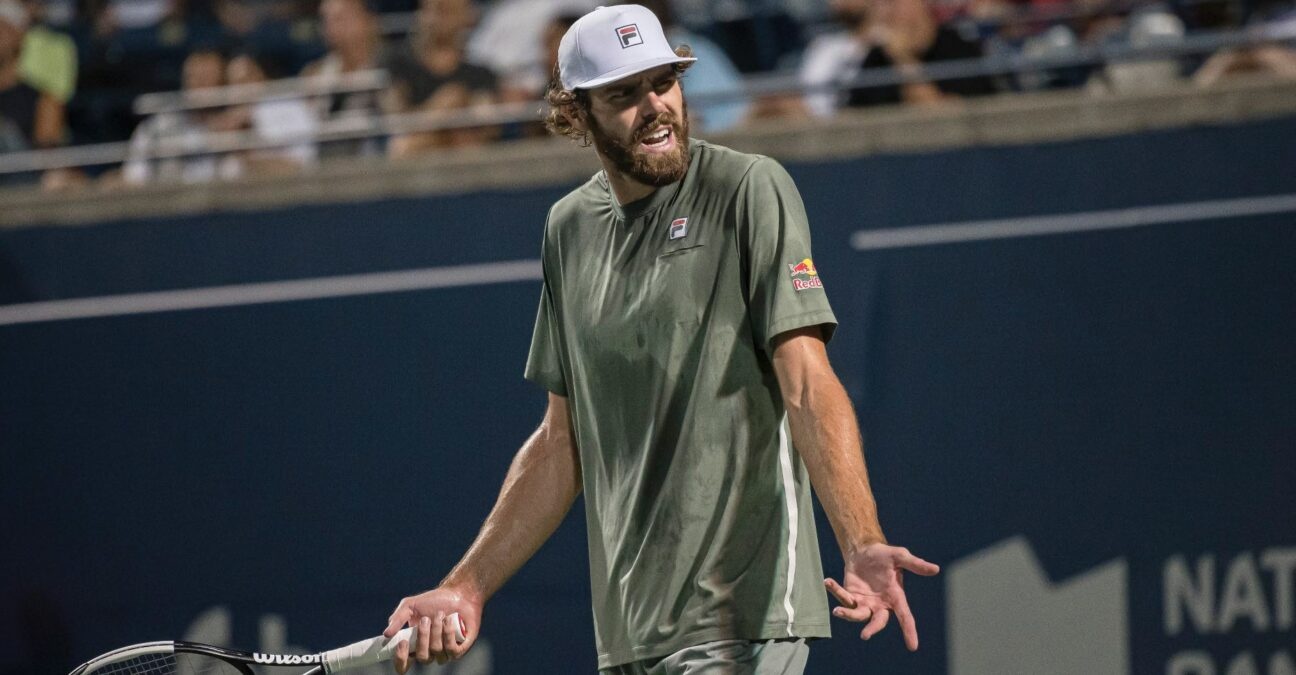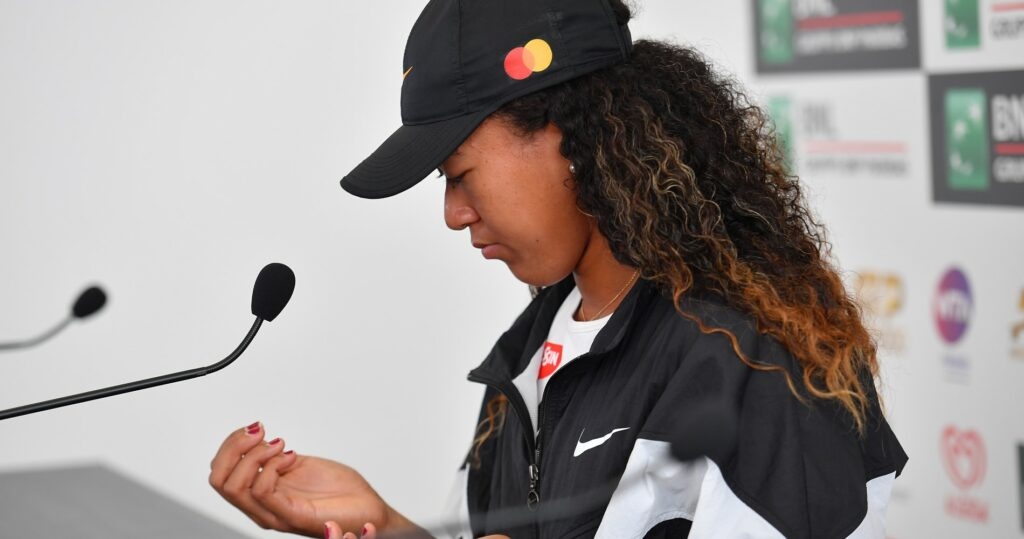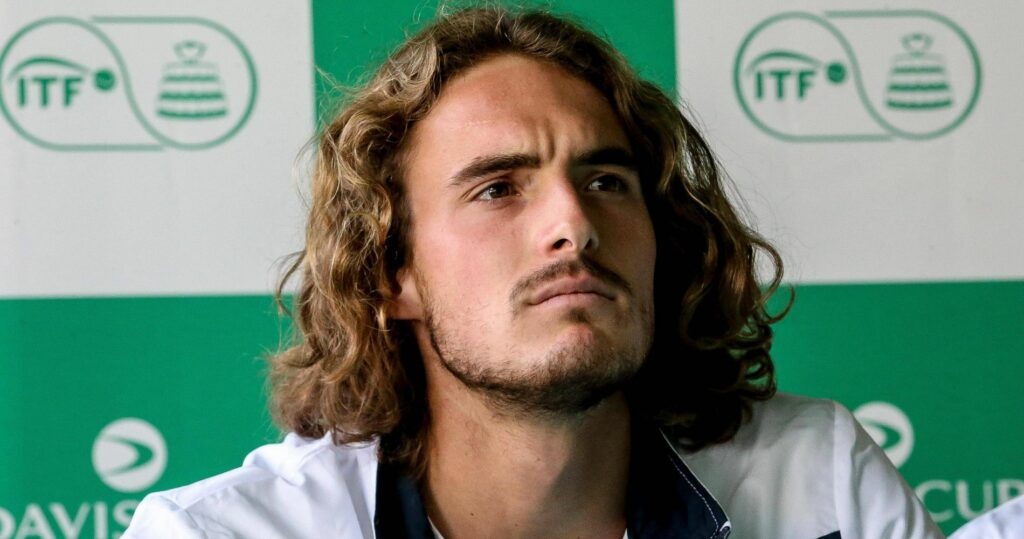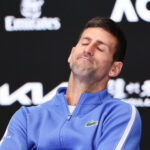What Opelka deserves to know after saying that tennis journalists all “suck”
Tennis journalists “suck”, says Reilly Opelka. We appreciate his candour but we owe him the same in return – hopefully with more nuance
 August 9, 2021, Toronto, on, Canada: The United States’ Reilly Opelka speaks to his coach during National Bank Open men’s tennis action against Australia’s Nick Kyrgios, in Toronto, Monday, Aug. 9, 2021. || 205917_0033 2021 ATP hommes masculin messieurs PRESS sport tennis TORONTO USA TODAY Sports zlast24 zselect Zuma ZUMAPRESS.com zwireservice zworld
August 9, 2021, Toronto, on, Canada: The United States’ Reilly Opelka speaks to his coach during National Bank Open men’s tennis action against Australia’s Nick Kyrgios, in Toronto, Monday, Aug. 9, 2021. || 205917_0033 2021 ATP hommes masculin messieurs PRESS sport tennis TORONTO USA TODAY Sports zlast24 zselect Zuma ZUMAPRESS.com zwireservice zworld
Since there is no flattering praise without the freedom to blame, the journalistic profession, which has made this famous adage its own, must also apply it to itself and consider with consideration the harsh criticism levelled at it by Reilly Opelka. “Journalists are terrible, they’re bad, some of them seem to be there just to criticise,” he said recently in an interview with the US website Inside Tennis, backing up what he had said at the US Open. “These guys don’t know anything about tennis.” I think we have the worst media in any sport. They’re horrible and they hold our sport back.
The giant American (2.11m) with the full beard and flowery polo shirts loses his wry sense of humour when journalists from his own country only talk to him about the overall decline of US tennis, at a time when he is at a career high, having become the US No 1 this season by reaching his first Masters 1000 final (in Toronto) and then the top 20 shortly afterwards. He is neither the first nor the last to complain about the negativity around him, especially across the Atlantic.
In the documentary “Untold: the Breaking Point”, Mardy Fish tells the story of how his career spiralled into anguish after he couldn’t handle the extra criticism and pressure, even though he was at the top of his game. And, of course, Naomi Osaka has spoken out about how press conferences can be dangerous to an athlete’s mental health. In her personal case, it was more precisely the recurring questions about her (non)-performance on clay just before the French Open that she had come to equate with a permanent devaluation, at least according to writings by her sister on Instagram.

In the reaction of both Opelka and Osaka, there is a bit of exaggeration but there is at least an observation that is difficult to refute: it is true, the tennis media have never been, and never will be, the players’ best friends. Because it is neither their job nor their vocation. Because they have divergent, and even antinomic, objectives.
“THE JOURNALISTS ARE TERRIBLE, BAD (…) THESE GUYS KNOW NOTHING ABOUT TENNIS. I THINK WE HAVE THE WORST MEDIA IN ALL SPORTS. THEY’RE HORRIBLE AND THEY HOLD OUR SPORT BACK.”
Reilly Opelka
The players need to hide in a bubble of confidence and serenity, supported in this goal by a staff of experts. Journalists, guided by their primary mission of reporting the facts and getting out information (juicy, if possible), need to pierce that bubble. Criticism – objective criticism – is part of the fundamental components of their job, not relaying good news, a mission dedicated to the communication organs (ATP, WTA, USTA, etc.). This can lead them to ask uncomfortable questions, sometimes in an unintentionally clumsy way, at the very least repetitive. This can take the player out of their comfort zone, or even instil doubt in their mind.
Without wanting to get into corporatism, which is not the subject here, especially as we are – like Opelka – judge and jury, most of the specialised journalists are above all enthusiasts who know their subject perfectly well. And they, too, dedicate their lives to tennis, simply in a different way from the players. Many of them are aware of Opelka’s immense merit. But their role is not to congratulate themselves, especially in a country – the United States of McEnroe, Connors, Sampras and Agassi – with such a glorious past, which for a long time dominated (sometimes even crushed at certain times) world tennis until the turn of the 21st century.Reilly’s annoyance at having to answer the same question 150 times about why no American man has won a Grand Slam since Andy Roddick at the 2003 US Open is understandable. It is still a legitimate question. If it is asked once, it is asked 150 times. That doesn’t stop the same journalists from writing, sometimes even too quickly, when things are better. In this case, the revival of US tennis, as recently highlighted by Brad Stine in the columns of L’Equipe, is almost as often highlighted as its decline. And it is also these same journalists who are frequently criticised for being too enthusiastic or optimistic. Go figure…
There has been a similar falling out in France between the media and the gang of four who have carried French tennis for more than 15 years. Jo-Wilfried Tsonga, Richard Gasquet, Gaël Monfils and Gilles Simon often regretted that whatever good results they had accumulated during this period were not enough to please the scribblers who were never happy. So much so that one of the four, who shall remain nameless, ended up likening them to “baltringues”. Whether or not they are “bums”, in a country like France, which, like the United States, is one of the founding pillars of tennis history, the absence of a (men’s) Grand Slam victory since the 1983 French Open will always be a sensitive issue until Yannick Noah finally finds a successor.
CRITICISM IS NOT DISAVOWAL
Criticism, however, is not disavowal, in fact it is usually the opposite. If nine out of 10 trains arrive on time, what’s the point of talking about those nine trains when the exception, in every sense of the word, is the tenth? Human beings are such that they are rarely lulled by the whirring sound of a rolling business. To sell papers to people who will read articles – because let’s not forget that there is no media without balanced accounts – you have to touch their sensibilities, by scratching out stories that are not always those that suit the actors. The danger is to magnify the features by tending towards sensationalism.
This last pitfall is often denounced by the players, whose slightest comments are often amplified and, according to them, distorted or even taken out of context. Many have come to close themselves off like oysters at press conferences, which have all too often become taps of lukewarm water and collections of hackneyed formulas that are more rhetorical than a mass sermon (a considered thought to the immutable “tough opponents” and “I will try my best” of Rafael Nadal). We understand them. But the solution has become almost worse than the problem: deprived of information or material to scratch, the journalists who have the least mastery of their subject will be all the more inclined to make a mountain out of a molehill. Even if it means digging up the wrong information, and angering the player, who will shut down even more. It’s the snake that bites its own tail.
Lines between players and media have changed
There was a time, long gone since the 1980s, when journalists went directly to the dressing room to debrief players, sometimes even over a beer. Today, the line between them is clearly marked. And it hasn’t got any better since the first lockdown in March 2020, which seems to have been an ideal pretext for the authorities to keep journalists away as much as possible, whose access to the stadium (and to the players) continues to be drastically limited.
Both the International Tennis Writers’ Association and the British Journalists’ Association recently sent a letter to the ATP and the WTA denouncing the zealous extension of video-conference press briefings, and trying to explain why in-person press conferences and interviews are beneficial for media and players alike. These may suit the organisers, but they certainly don’t help the journalists to do a good job. What’s worse is that not all the players like them: Naomi Osaka herself said that the video conference was oppressive and that she preferred to have the journalists in front of her.
But with all this, the player’s word has become rare, and therefore precious. At least the word collected directly by the journalist, without the filter of social networks or the formal framework of press conferences. It requires, at the very least, to have his trust. This is maintained through a balancing act consisting of preserving one’s freedom to blame while avoiding awkwardly offending sensitivities, in order to constantly give priority to facts of public interest. The result can be a slightly softened tone, slightly toned-down criticism, and that is all it takes for the same journalists accused of all manner of devilry by some to be suspected of connivance by others.

STEFANOS TSITSIPAS TO JOURNALISTS: “YOU MAKE THIS SPORT BETTER.”
At the end of the day, no matter what they write, journalists are more often than not seen as the black sheep of an environment that often forgets what it owes to the media coverage of the game. Of course, there are not only good articles that come out. There are even some very bad ones, even malicious ones. But overall, the press remains an essential link in the chain, without which sporting performances would not be brought to the general public with responsiveness, precision, often with high standards, and with an epic breath of fresh air for the biggest tournaments. All this for the greater benefit of the players.
We note that the best players, at least those who are most serene with themselves, rarely complain about the media ecosystem. Some even appreciate it, like Stefanos Tsitsipas, who ldeclared his love for journalists at Indian Wells, telling them they made the sport “better”, in complete contrast to Opelka. At worst, they play it, or they live with it. Sometimes they don’t realise the constraints of the job until they are on the other side of the fence, as consultants. And we are sure that with his caustic humour and sharp wit, Opelka would make an excellent pundit.
People in this post
More tennis news
January 20, 2008: The day Hewitt and Baghdatis finished the latest match in Australian Open history

Tony Jones apologies to Djokovic for offensive comments

Djokovic refuses on-court interview after host broadcaster “mockery”

Alcaraz on Djokovic quarter-final: “Not the right player to be facing!”

British, US Open, Next Gen: Everything you always wanted to know about Jack Draper (but never had time to find out) – updated after Australian Open







Remember when Ben Rothenberg wrote an entire article about how no WTA players wanted to emulate her body because it was deemed too masculine? Tennis journalists are the scum of the Earth